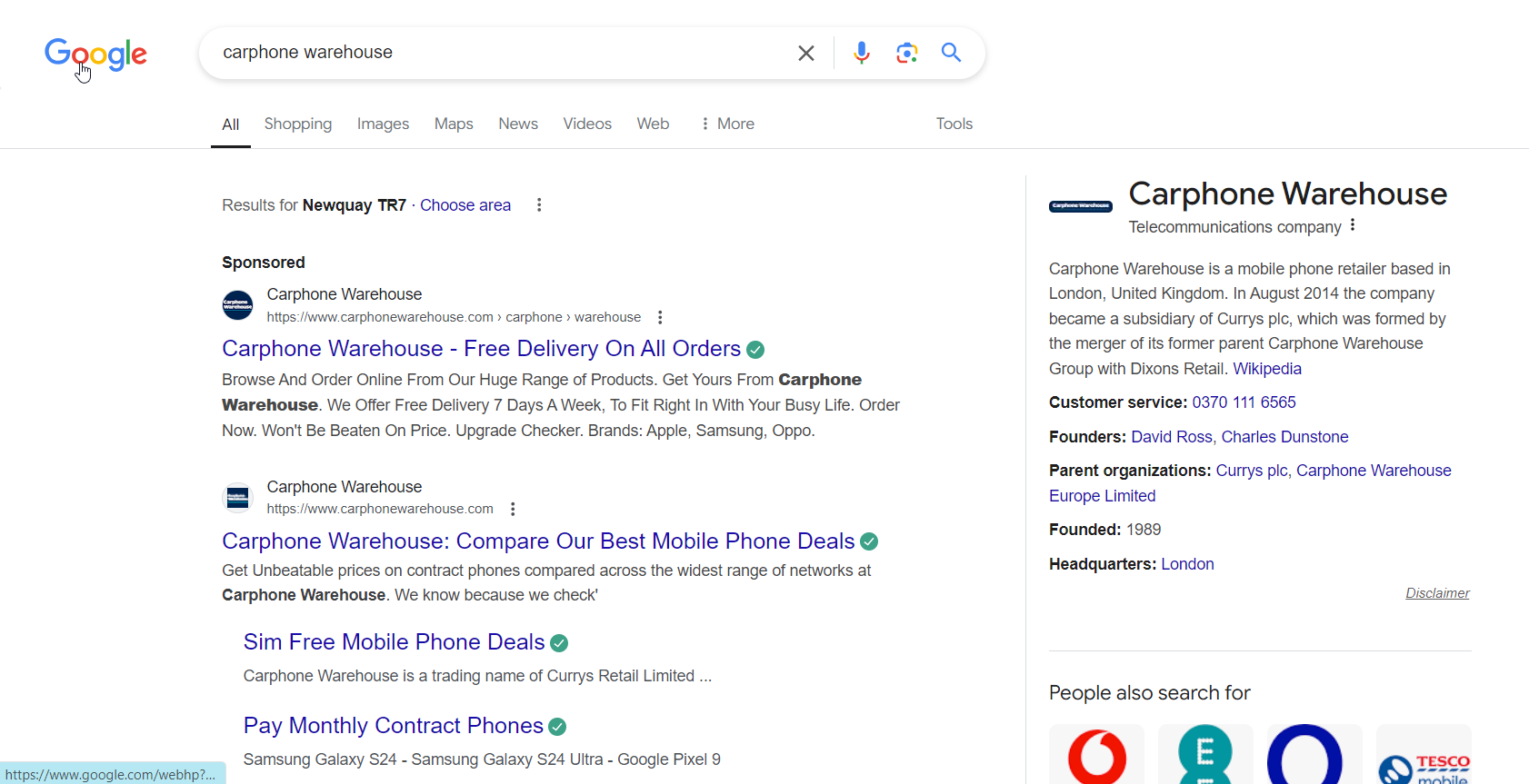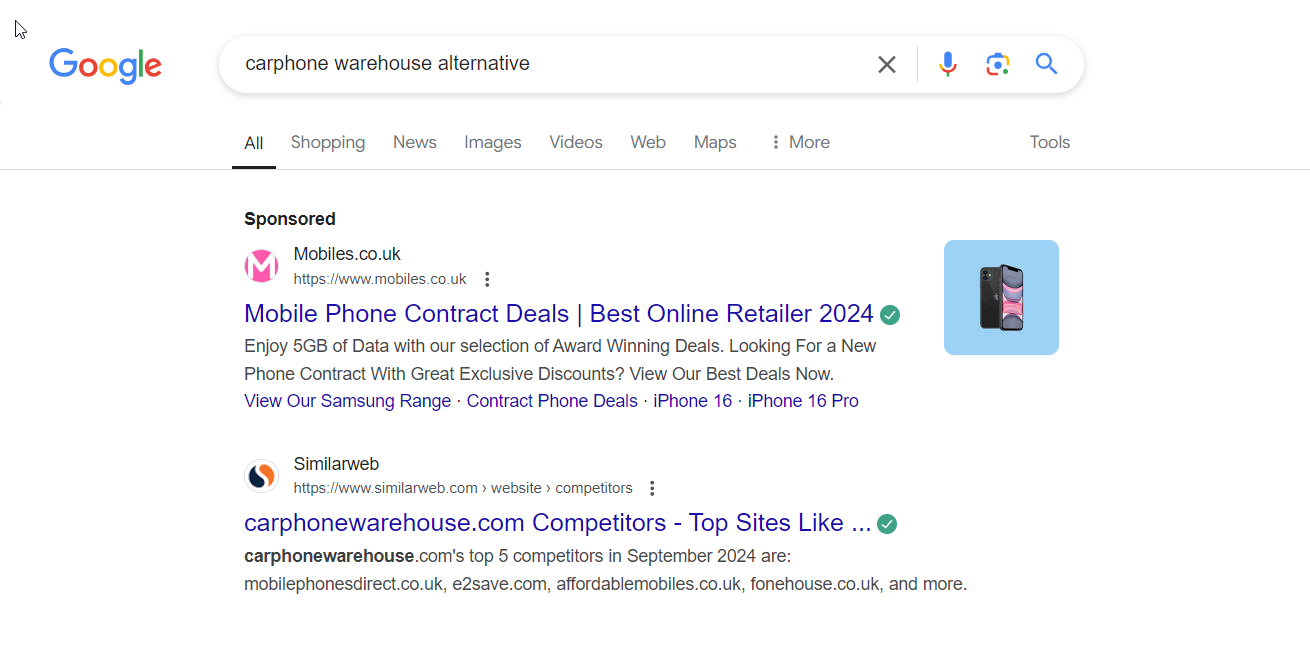In the intricate dance of digital marketing, understanding the terms “branded terms” and “competitor terms” is crucial for anyone looking to optimise their online presence. These concepts are fundamental in navigating the competitive landscape of Google Ads and other PPC platforms, influencing strategies that can significantly impact a company’s visibility and customer acquisition efforts.
Branded terms are those that include the name of your brand or specific products, like “NeoClean detergents” or simply “NeoClean.” These are pivotal in drawing in users who are already aware of your brand and are potentially at the cusp of making a purchase. On the other hand, competitor terms involve the names and products of rival companies, such as “BetaTech software solutions,” used strategically to intercept or attract customers from competitors. Both types of terms play distinct roles in a brand’s search engine marketing (SEM) strategies, each with their advantages and considerations.

What are Brand Terms?
Branded terms, also known as branded keywords, are search phrases that include the name of your brand, specific product names, or other trademarked terms associated with your company. These terms are used by individuals who are already aware of your brand or are interested in your specific products or services, indicating a higher level of intent compared to generic, non-branded keywords.
For example, if your company is named “NeoClean,” branded terms might include “NeoClean detergents,” “NeoClean store near me,” or simply “NeoClean.” These searches are likely made by users who are familiar with your brand or who are in the later stages of the buying process, making them particularly valuable for targeting in advertising and SEO strategies.
What are Competitor Terms?
Competitor brand terms refer to search phrases that include the names of competing brands, their specific product names, or other trademarked elements related to those companies. These terms are often used by businesses in their digital marketing and advertising strategies to target customers who are searching for products or services offered by their competitors.
For example, if a company, let’s say “AlphaTech,” wants to attract customers from a rival company “BetaTech,” they might bid on competitor brand terms such as:
- “BetaTech software solutions”
- “BetaTech customer service”
- “Buy BetaTech laptops”
Using competitor brand terms in advertising campaigns can help a company to:
- Increase Visibility: Appear in search results when potential customers are looking for competitors, thus increasing the visibility of their own offerings.
- Compare Offerings: Present their products or services as alternatives to those of the competitor, highlighting unique selling points or better value.
- Capture Market Share: Attract customers who are undecided or looking for additional options beyond what the competitor provides.
However, using competitor brand terms must be approached cautiously to avoid potential legal issues, especially regarding trademark use, and to maintain a positive brand image without engaging in overly aggressive tactics.

Should I bid on My Own Brand Terms?
Yes, bidding on your own brand terms in Google Ads and other PPC platforms is generally advisable for several strategic reasons:
Control Over Search Results
Bidding on your brand terms helps ensure that your adverts appear at the top of the search results, giving you control over the first impression potential customers have when they search for your brand. This is particularly important if competitors are also bidding on your brand terms, as it allows you to maintain prominence in search results.
Defend Against Competitor Ads
If you don’t bid on your brand terms, competitors might, which can lead to them capturing traffic that was likely intended for your site. By bidding on these terms, you protect against competitors trying to siphon away your customers.
Enhanced Ad Features
Paid ads offer more features than organic search results, such as sitelinks, call extensions, location information, and additional text. These features can improve the user experience and make it easier for customers to interact with your brand.
Higher Conversion Rates
Users searching for your brand terms have high intent, which often translates to higher conversion rates. They are already familiar with your brand and are more likely in the consideration or decision stage of the buying process.
Cost Efficiency
Brand terms usually have lower cost-per-click (CPC) rates because they are less competitive than broader industry terms. They also tend to have higher Quality Scores due to their relevance and expected click-through rate (CTR), reducing the cost even further.
Ability to Control Messaging
Bidding on your brand terms allows you to control the messaging seen by those searching for your brand. This is especially useful for highlighting specific campaigns, promotions, or announcements that might not be as prominent in organic search listings.
Comprehensive Brand Strategy
Including your brand terms in PPC campaigns complements your organic search efforts. Even if you have strong organic rankings, paid adverts can capture additional traffic and provide another avenue for conversions.
Market Insights
Running branded campaigns provides valuable data on search trends, user behaviour, and advert performance related to your brand. This information can be used to refine your overall marketing strategy.
Potential Downsides
While there are compelling reasons to bid on your brand terms, it’s important to consider potential downsides:
- Cost Consideration: Although typically low, the cost of bidding on your brand terms is still an additional expense. If your budget is limited, these funds might be allocated more effectively elsewhere, especially if your organic search results already dominate the page.
- Cannibalisation: There’s a risk that paid ads could cannibalise traffic that would have come to your site organically. This needs careful monitoring to ensure that the paid strategy is indeed adding value, not just shifting organic traffic to paid.
Ultimately, the decision to bid on your brand terms should be informed by a detailed analysis of your specific market, competitive landscape, and overall marketing objectives.

Should I Bid on Competitor Terms?
Bidding on competitor brand terms can be a strategic decision in your PPC campaigns, but it should be approached with caution and consideration. Here are some key factors to consider when deciding whether to bid on competitor terms:
Pros of Bidding on Competitor Terms
Increased Visibility: Bidding on competitor terms can increase your brand’s visibility among users who are searching for products or services similar to yours but are familiar with your competitors. This can help you capture potential customers at a crucial decision-making point.
Market Penetration: It allows you to directly engage with a competitor’s audience, potentially converting users who may be looking for alternatives or comparing options.
Competitive Advantage: If your competitors are not bidding on their own brand terms or if they have weak PPC strategies, bidding on their terms can give you a strategic advantage.
Controlled Messaging: You can control the narrative by highlighting your strengths or unique selling propositions (USPs) directly in response to competitor searches, effectively differentiating your brand.
Cons of Bidding on Competitor Terms
Legal and Ethical Considerations: There are potential legal issues if the competitor has trademarked terms. Additionally, this strategy might be seen as aggressive or unethical in some industries, potentially impacting brand perception.
Higher Cost and Lower Quality Score: Since these terms are not directly related to your brand, Google may assign a lower Quality Score to your ads, resulting in higher costs per click and potentially less effective ad spend.
Risk of Retaliation: If you start bidding on your competitors’ terms, they might retaliate by bidding on yours, which could inflate costs for both parties and lead to a bidding war.
Limited Conversion Rates: Users searching for a specific competitor may have a strong brand loyalty, making them less likely to convert to your brand, which could result in lower ROI for these campaigns.
Best Practices
If you decide to bid on competitor terms, here are some best practices to follow:
Respect Trademarks: Never use competitors’ trademarked names in your ad copy. This is not only a best practice but also a requirement in many legal frameworks to avoid trademark infringement.
Focus on Value Proposition: Instead of directly attacking or comparing with the competitor, focus on what makes your brand or product unique. Provide clear, compelling reasons why a consumer should consider your brand as an alternative.
Monitor Performance Closely: Keep a close eye on the performance of campaigns that use competitor terms. Be ready to adjust your strategy based on what the data tells you about costs and conversion rates.
Be Subtle and Strategic: Consider using competitor terms in a more nuanced way, such as bidding on generic terms that might also be associated with your competitors or using dynamic keyword insertion to adapt your ad copy more broadly to search contexts.
Ultimately, the decision to bid on competitor terms should align with your overall marketing strategy and ethical considerations. It can be effective in certain contexts, especially in highly competitive markets, but requires careful handling to avoid potential downsides.
Avoid Overbidding on Your Branded Keywords
Allocating part of your budget to branded keywords is necessary, but it’s crucial not to overbid on them. Branded keywords typically have the lowest cost-per-click (CPC) among all your search campaigns, so overbidding can lead to unnecessary expenditure and diminish your return on investment.
To maintain control over your branded keyword budget, consider using a manual CPC bidding strategy. This approach allows you to set specific bid limits for each search term. You can then manually adjust these bids at the keyword level to ensure that your spending on branded keywords remains efficient and effective.
Additionally, adjust your ad schedule to prevent your ads from running at suboptimal times, such as overnight or during weekends, when search traffic might not convert as effectively.
Utilise Negative Keywords
Negative keywords play a critical role in refining PPC campaigns, ensuring that your ads don’t appear for searches that are irrelevant to your goals. This applies to both branded and non-branded campaigns.
Utilise the Search Terms report to identify which terms have previously triggered your ads and continuously update your list of negative keywords to include irrelevant or unproductive queries.
For branded campaigns, consider whether you need to include negative keywords such as:
- “[your brand name] careers” (unless recruitment is one of the objectives of your PPC efforts)
- “[your brand name] jobs“
- “[your brand name] Twitter”.
The goal is to prevent your ads from showing up for searches that do not directly contribute to your strategic objectives or lead-generation efforts. For example, a searcher looking for “[brand name] careers” might not benefit from a standard consumer-facing landing page if they intend to find job openings. Likewise, someone searching for reviews on Trustpilot might not be looking to purchase immediately, making such clicks less valuable.
Conclusion
Navigating the realms of branded and competitor terms in your PPC campaigns is not just about increasing traffic—it’s about strategic brand positioning and intelligent customer engagement.
When you bid on your own branded terms, you take control of your brand narrative and safeguard your digital space from competitors’ encroachments. This approach not only enhances visibility but also bolsters user trust and conversion rates due to the high intent of searchers already familiar with your brand. Meanwhile, employing competitor terms requires a delicate balance of aggression and caution, providing an opportunity to tap into their customer base while managing potential legal and ethical implications.
Whether you choose to focus on branded terms to fortify your own standing or engage with competitor terms to expand your reach, each strategy must be implemented with a clear understanding of its impact on your overall marketing goals and budget. Strategic use of these terms, aligned with thorough monitoring and continuous optimisation, can lead to sustained growth and a strong competitive edge in the bustling online marketplace.